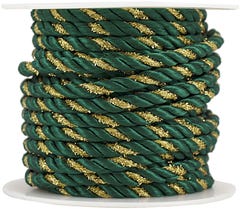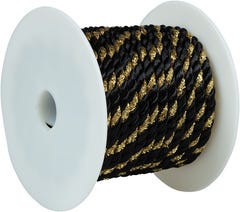Free ground shipping, excluding Alaska, Hawaii, and Canada

Rope
Unleash a touch of rustic elegance with our Rope Ribbon! This textured gem, with its authentic rope-like design, weaves a cozy, natural vibe into any project. Perfect for sprucing up home decor with a hint of countryside charm, or crafting rustic-themed masterpieces that echo nature's beauty. Even gift wrapping gets a rustic makeover with this ribbon, turning every present into a delightful treasure. Our collection boasts shades that pop, like the vibrant Green with Gold and the sophisticated Black with Gold, each offering a unique blend of rustic allure and timeless elegance. So, whether you're crafting, decorating, or gifting, Rope Ribbon is your ticket to adding a touch of rustic magic to every creation!
The Versatility of Rope
Key Summary:
- This article will explore the uses and benefits of rope in various applications, from crafting to packaging.
- Readers will learn about the different types of rope available and how to choose the right one for their needs.
- Key findings will cover types of rope, choosing the right rope, real-world use cases, and tips for selecting and using rope effectively.
Rope is a versatile tool that plays a crucial role in various industries and everyday tasks. From crafting intricate designs to securing heavy loads, rope is an essential item to have on hand. This article will delve into the different types of rope available, the factors to consider when choosing the right one, and real-world examples of how rope can be used effectively. Whether you're a DIY enthusiast or a professional in need of reliable tools, understanding the versatility of rope can enhance your projects and daily tasks.
Types of Rope
When it comes to choosing the right rope for your needs, understanding the different types available is crucial. Two main categories of rope are natural fiber and synthetic rope, each with its own set of benefits and drawbacks.
Natural Fiber Rope
Natural fiber rope is made from materials such as cotton, hemp, and jute. These ropes are biodegradable and have a softer feel compared to synthetic ropes. However, natural fiber ropes are more prone to rotting and breaking down over time, especially when exposed to moisture.
One of the ideal uses for natural fiber rope is in gardening, where it can be used for trellising plants or creating decorative accents. DIY projects like macrame and weaving also benefit from the natural look and feel of these ropes.
Synthetic Rope
Synthetic ropes are made from materials like nylon, polyester, and polypropylene. These ropes are known for their durability and resistance to weather conditions, making them ideal for outdoor use. Synthetic ropes are also stronger than natural fiber ropes and can handle heavier loads.
Common applications for synthetic rope include marine use, where it is used for mooring lines and towing. In industrial settings, synthetic rope is preferred for its strength and reliability in securing equipment and machinery.
Choosing the Right Rope
When selecting the right rope for your project, there are several factors to consider to ensure you get the best results. Understanding the key characteristics of rope and how they align with your needs is essential for a successful outcome.
Factors to Consider
The diameter, strength, and flexibility of the rope are important factors to consider when choosing the right one for your project. Thicker ropes are stronger but less flexible, while thinner ropes may not be able to support heavy loads. Consider the environmental conditions and intended use of the rope to ensure it will perform well in your specific application.
Additionally, your budget and the availability of different types of rope will also play a role in your decision-making process. Natural fiber ropes are typically more affordable but may not be suitable for all projects, while synthetic ropes offer durability but come at a higher cost.
Who Can Benefit from Using Rope
Rope is a versatile tool that can be beneficial for a wide range of individuals and industries. Here are some examples of who can benefit from using rope:
- DIY enthusiasts looking to create unique projects
- Gardeners in need of a natural and biodegradable material for plant support
- Marine professionals requiring strong and durable ropes for mooring and towing
- Construction workers needing reliable ropes for securing equipment and materials
- Campers and outdoor enthusiasts looking for versatile tools for various tasks
When to Utilize Rope for Your Projects
Knowing when to use rope for your projects can help you achieve the best results. Here are some scenarios where utilizing rope can be beneficial:
- When you need to secure items in place during transportation or storage
- For creating decorative accents in home decor projects
- When working on outdoor tasks that require durable and weather-resistant materials
- For crafting projects that involve weaving, macrame, or jewelry making
- In emergency situations where a strong and reliable tool is needed
Examples of Rope in Various Use Cases
Crafting
- Creating macrame wall hangings or plant hangers
- Designing unique jewelry pieces using rope as a base material
- Incorporating rope into woven baskets or decorative accents
- Using rope for DIY projects like coasters, keychains, or bookmarks
- Adding texture and visual interest to art pieces or sculptures
Packaging
- Enhancing the presentation of gifts with decorative rope bows or accents
- Securing packages and parcels for shipping or storage
- Creating unique gift wrapping designs using colorful ropes
- Adding a rustic or natural touch to product packaging with twine or jute rope
- Using rope as a sustainable and eco-friendly alternative to traditional packaging materials
What Sets Our Product Apart
Our rope stands out from the competition due to its high-quality materials and construction. We source the finest natural fibers and synthetic materials to ensure durability and reliability in every product. Additionally, our ropes are designed to be versatile and suitable for a wide range of applications, making them a go-to choice for professionals and DIY enthusiasts alike.
List of Use Cases for Our Product
Our rope can be used in various scenarios to enhance functionality and aesthetics. Some common use cases include crafting, packaging, marine applications, gardening, and construction. The versatility of our product allows for endless possibilities, from creating intricate designs to securing heavy loads with ease.
How to Make the Most of Your Adventure with Our Product
To get the most out of your experience with our rope, it's essential to choose the right type for your specific needs. Consider factors such as diameter, strength, and flexibility to ensure optimal performance. Additionally, familiarize yourself with common knots and techniques for securing rope properly to maximize its utility. By following these tips, you can embark on your projects with confidence and achieve outstanding results with our high-quality rope.
Unleashing the Power of Rope
From crafting to packaging, rope serves as a versatile tool with a wide range of applications. By understanding the different types of rope available, factors to consider when choosing the right one, and real-world examples of how rope can be used effectively, readers can unlock the full potential of this essential item. Whether you're a DIY enthusiast, a gardener, a marine professional, or an outdoor enthusiast, incorporating rope into your projects can enhance functionality and aesthetics. Embrace the versatility of rope and explore the endless possibilities it offers in various industries and everyday tasks.





















